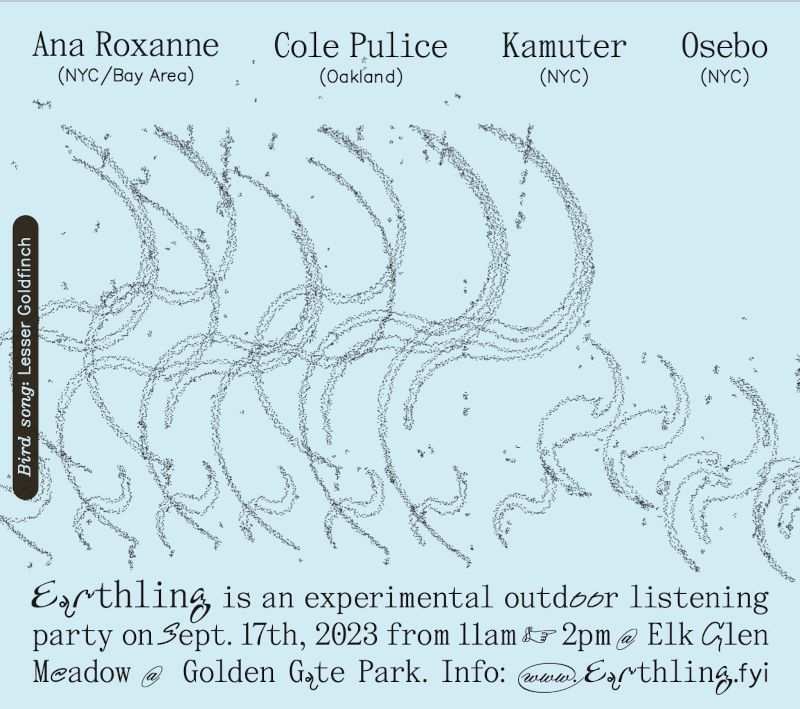A Stable Earth Container
Ana Roxanne and Cole Pulice in Golden Gate Park, Leaving Records, listening/non-listening

Earthing @ Golden Gate Park
San Francisco, CA
Sept. 17, 2023
“There’s probably a lot of kindred spirits here,” said Earthling organizer Tyler Mincey, encouraging attendees of the series’ inaugural show in a Golden Gate Park picnic area to chat freely during the performances. This might’ve given me pause, having had (like you) countless delicate musical moments ruined by jabbering bar patrons. What goes unspoken about bars is that they are designated for the good time of oblivious jabberers perhaps even more than that of any intent listeners, regardless if the former is directly impeding the latter. But here, in a green expanse, Mincey’s invitation to gab was so welcome—so in line with the event’s ethos and sounds to follow—it affirmed Earthling as the sort of intentional space where spirits might actually find affinity.
A donation-based showcase of uniformly delicate and capacious music in a natural setting, Earthling borrows much of its form and philosophy from the monthly concert series listen to music outside in the daylight under a tree, hosted since 2018 in Los Angeles city parks by the label Leaving Records. Leaving pointedly advertises its series’ offerings, and those of the label, as “all genre”. This plain language does a nice job of eliding sometimes low-effort catch-all terms like ambient, New Age, or experimental—those generally tagged to contemplative, gentle, slippery, or long-form sounds. (It should be noted the Leaving series has hosted plenty of stuff that’s loud, energetic, or of an un-chill disposition.) It also handily precludes any audience expectations, inviting people to pull up a patch of grass and engage with the sounds as they will.
There’s something to the simple elegance of this format and its framing. This non-specificity, and all its attendant permissiveness, lays bare the option of active, passive, deep, or non-listening—a choice always available yet rarely acknowledged. (Mincey’s closing remarks gave a subtle shoutout to Pauline Oliveros.) This approach promises a refreshingly permeable experience by inviting awareness of one’s own engagement and how, at best, it might enhance that of others.
At the same time, with respect to its basic components—listening to music neither in a club nor at night—Earthling did look a lot like any other outdoor gig. There’s plenty of free open-air music happening in Golden Gate Park on any given weekend—silent discos, playa bangers from Bluetooth speakers, Aquarians with keyboards hawking CD-Rs—let alone the park’s extensive history of festivals and radical be-ins. Still, something felt new, or at least newly elevated, about the possibilities of Earthling’s presentation.
Cole Pulice played idyllic jazz for wind instruments both analog and digital. A few numbers on a MIDI woodwind, highly expressive like a real reed but cut with binary VST sheen, were not evocative of nature as such but a canny simulacra—a shimmering grotto in a fifth-gen console RPG. Taking saxophone leads over celestial synth loops, Pulice moved gracefully between the bucolic and the bittersweet. Surrounded by pleasant sun-dappled tones, a lesser player—someone less inclined to move with ambiguity—might resort to too much anthemic lyricism, but many of Pulice’s melodic lines started serene and ended wistful, turning inward, caught on a conjunctive phrase.
“Anything you want, I’ll do it,” one-time Leaving artist Ana Roxanne sang over a chiming synth arpeggio, her voice immense with reverb. Her music managed to be both the most exuberant and ominous of the afternoon, natural splendor meeting sheets of forbidding static. Roxanne assembled tidal beds of sustained vocal notes on a loop station, the occasional longing oooh calling out from a foggy distance. A few conventionally song-shaped pieces were akin to the psych-folk of Tara Jane O’Neil, but instead of pastoral acoustic guitar, Roxanne’s were driven by plucked Hofner violin bass, a tone cast in shadow.
One significant way the event met its intentions was the optimally-sized sound system, the live engineer allowing an output that filled the Elk Glen Picnic Area without forcing blanket dwellers to raise their voices. Conversations occasionally bubbled but were generally muted. Listeners mostly hissed open hard and soft beverages, filled Moleskins with sketches and couplets, shaded their faces with books. A strong turnout for an ambient gig of any stripe, the gathering distributed 120 wristbands and drew a consistent stream of paused trail walkers and stroller pushers, creating a zone of ambling ongoingness.
This could have simply amounted to a thoughtfully-scaled outdoor music show that managed, better than your average festival, to adequately accommodate one’s physical comfort and, unlike most club gigs, played gently with one’s attention and sensorium. Instead, Earthling was a public outdoor show that embraced the form of a permeable membrane, empowering the audience to seek what it wants from the experience. It’s a form worth emulating.
So where was my mind? Mostly flickering, mostly in pleasant states of Sunday afternoon lilt. I tried and failed to congeal runny thoughts about metabolizing music that samples or beckons nature while sitting in nature. Still, I lent wholesale attention to events that demanded it. Pulice dragged a stack of harmonized horn tones through heaving, destabilizing portamento rises that straightened into triumphant full-voiced chords (think the THX cinema intro before the feature presentation), only to curdle them with dour key modulations. Roxanne performed “Venus”, a poem about the many capacities of water spoken over the effervescent surge of an ocean field recording. It had the assuring cadence of a guided meditation—a form clearly appreciated by a few ecstatic dancers across the lawn—but didn’t shy away from floods and other perilous depths. “Water is generous,” Roxanne recited, “perhaps a little too generous.”
It was the patient build, skirting the risk of lulling the audience out of orbit, that allowed these more emphatic gestures to pay off. The opening set from Kamuter was “all genre” in that it casually avoided committing to any particular velocity or sonic palette for long, a succession of modes that were largely active but not too insistent. A pensive stretch of glacial pads slowly washed into a bob of dubby chords bouncing along a gentle kick drum grid. Later some unobtrusive horn leads sailed over an inoffensively filtered illbient beat. This indeterminacy invited a few treacly chill-out tropes: birdsong through ping-pong delay, some less-than-profound vocal samples (“What would life be like if we couldn’t dream?”). But the intentions were apt. Mere moments into the set, the sun peeked out from behind the morning fog and Kamuter flashed us a gleeful thumbs-up. A worthy reminder, in this decidedly reflective space, to tally small gratitudes. Not to mention an auspicious start: the sun shone generously all afternoon.

